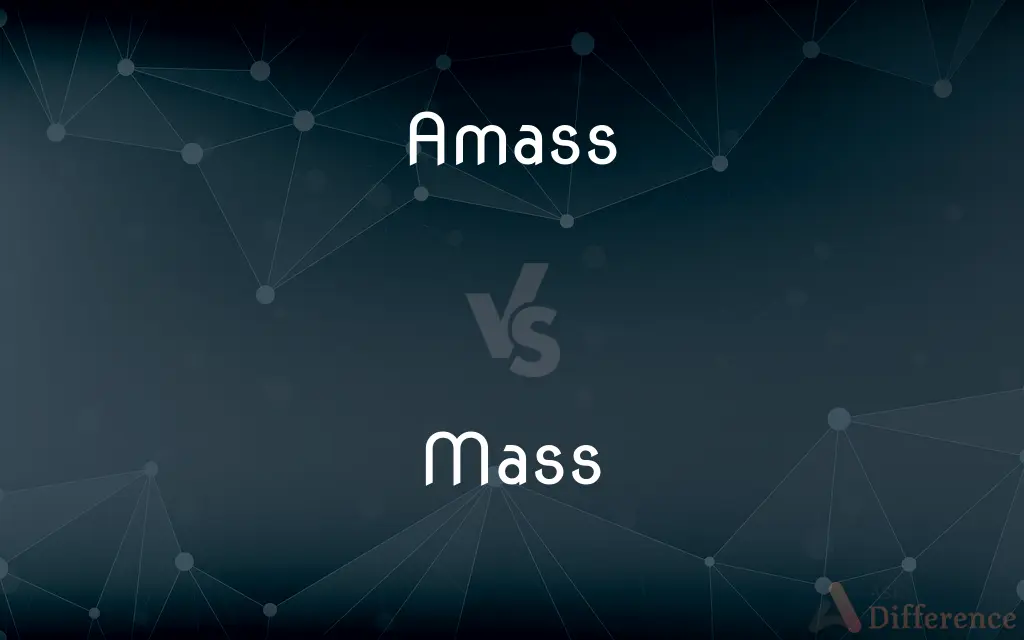Amass vs. Mass — What's the Difference?
By Tayyaba Rehman — Published on December 13, 2023
"Amass" means to gather or accumulate, often in large quantities, while "Mass" refers to a lump or collection of matter, or a large number of people or objects.

Difference Between Amass and Mass
Table of Contents
ADVERTISEMENT
Key Differences
"Amass" is a verb that indicates the action of collecting or gathering. Whether it's wealth, knowledge, or items, when you amass something, you're building up a collection. On the other hand, "Mass" can be a noun referring to a cohesive body of matter or a large group of people.
In another sense, "Amass" can imply an intentional effort to accumulate something. For instance, one might amass a fortune through years of hard work and investment. "Mass", when referring to an object, doesn't necessarily imply intention—it's simply a quantity of matter.
"Amass" is often used in contexts where there's a progression or accumulation over time. It suggests a gradual gathering or building up. "Mass", conversely, is more static, representing a set quantity or collection at a given time.
Furthermore, while "Amass" always refers to the act of accumulation, "Mass" has broader applications. It can refer to religious services in certain contexts, or in physics, it denotes the amount of matter in an object.
Comparison Chart
Part of Speech
Verb
Noun (primarily)
ADVERTISEMENT
Meaning
To gather or accumulate
A lump or collection of matter
Implication
Often implies intention or effort
Doesn't necessarily imply intention
Usage in Progression
Suggests a gradual accumulation over time
Represents a set quantity or collection
Broader Contexts
Primarily about gathering or collecting
Can refer to religious services or physical properties
Compare with Definitions
Amass
To collect for oneself.
She aimed to amass as much knowledge as possible.
Mass
A large number of people or objects.
A mass of fans waited outside.
Amass
To come together; assemble.
Fans began to amass outside the concert venue.
Mass
Pertaining to, involving, or affecting a large number of people.
Mass transportation caters to the public at large.
Amass
To grow or increase in number.
Over the years, the small village amassed a larger population.
Mass
Public celebration of the Eucharist in the Roman Catholic Church and some Protestant churches.
Amass
To gather together or accumulate a large quantity of (something)
Amass evidence.
Amass a fortune.
Mass
The sacrament of the Eucharist.
Amass
To be the site of (an increasing mass), especially as a result of neglect
How long has the desk been amassing bills?.
Mass
A musical setting of certain parts of the Mass, especially the Kyrie, Gloria, Credo, Sanctus, and Agnus Dei.
Amass
To come together; collect
Troops amassing on the border.
Mass
A unified body of matter with no specific shape
A mass of clay.
Amass
(transitive) To collect into a mass or heap.
Mass
A grouping of individual parts or elements that compose a unified body of unspecified size or quantity
"Take mankind in mass, and for the most part, they seem a mob of unnecessary duplicates" (Herman Melville).
Amass
(transitive) to gather a great quantity of; to accumulate.
To amass a treasure or a fortune
To amass words or phrases
Mass
A large but nonspecific amount or number
A mass of bruises.
Amass
(intransitive) To accumulate; to assemble.
Mass
A lump or aggregate of coherent material
A cancerous mass.
Amass
(obsolete) A large number of things collected or piled together.
Mass
The principal part; the majority
The mass of the continent.
Amass
(obsolete) The act of amassing.
Mass
The physical volume or bulk of a solid body.
Amass
To collect into a mass or heap; to gather a great quantity of; to accumulate; as, to amass a treasure or a fortune; to amass words or phrases.
The life of Homer has been written by amassing all the traditions and hints the writers could meet with.
Mass
Abbr. m(Physics) A property of matter equal to the measure of the amount of matter contained in or constituting a physical body that partly determines the body's resistance to changes in the speed or direction of its motion. The mass of an object is not dependent on gravity and therefore is different from but proportional to its weight.
Amass
A mass; a heap.
Mass
An area of unified light, shade, or color in a painting.
Amass
Collect or gather;
Journals are accumulating in my office
The work keeps piling up
Mass
(Pharmacology) A thick, pasty mixture containing drugs from which pills are formed.
Amass
Get or gather together;
I am accumulating evidence for the man's unfaithfulness to his wife
She is amassing a lot of data for her thesis
She rolled up a small fortune
Mass
Masses The body of common people or people of low socioeconomic status
"Give me your tired, your poor, / Your huddled masses yearning to breathe free" (Emma Lazarus).
Amass
To gather together or accumulate over a period of time.
He managed to amass a significant collection of vintage cars.
Mass
To gather or be gathered into a mass.
Amass
To pile up; accumulate.
The company has amassed huge debts over the years.
Mass
Of, relating to, characteristic of, directed at, or attended by a large number of people
Mass education.
Mass communication.
Mass
Done or carried out on a large scale
Mass production.
Mass
Total; complete
The mass result is impressive.
Mass
(physical) Matter, material.
Mass
A quantity of matter cohering together so as to make one body, or an aggregation of particles or things which collectively make one body or quantity, usually of considerable size.
Mass
(obsolete) Precious metal, especially gold or silver.
Mass
(physics) The quantity of matter which a body contains, irrespective of its bulk or volume. It is one of four fundamental properties of matter. SI unit of mass: kilogram.
Mass
(pharmaceutical drug) A medicinal substance made into a cohesive, homogeneous lump, of consistency suitable for making pills; as, blue mass.
Mass
(medicine) A palpable or visible abnormal globular structure; a tumor.
Mass
(bodybuilding) Excess body weight, especially in the form of muscle hypertrophy.
Mass
(proscribed) weight
Mass
A large quantity; a sum.
Mass
Bulk; magnitude; body; size.
Mass
The principal part; the main body.
Mass
A large body of individuals, especially persons.
The mass of spectators didn't see the infraction on the field.
A mass of ships converged on the beaches of Dunkirk.
Mass
(in the plural) The lower classes of persons.
The masses are revolting.
Mass
(Christianity) The Eucharist, now especially in Roman Catholicism.
Mass
(Christianity) Celebration of the Eucharist.
Mass
The sacrament of the Eucharist.
Mass
A musical setting of parts of the mass.
Mass
(transitive) To form or collect into a mass; to form into a collective body; to bring together into masses; to assemble.
Mass
(intransitive) To assemble in a mass
Mass
To celebrate mass.
Mass
Involving a mass of things; concerning a large quantity or number.
There is evidence of mass extinctions in the distant past.
Mass
Involving a mass of people; of, for, or by the masses.
Mass unemployment resulted from the financial collapse.
Mass
The sacrifice in the sacrament of the Eucharist, or the consecration and oblation of the host.
Mass
The portions of the Mass usually set to music, considered as a musical composition; - namely, the Kyrie, the Gloria, the Credo, the Sanctus, and the Agnus Dei, besides sometimes an Offertory and the Benedictus.
Mass
A quantity of matter cohering together so as to make one body, or an aggregation of particles or things which collectively make one body or quantity, usually of considerable size; as, a mass of ore, metal, sand, or water.
If it were not for these principles, the bodies of the earth, planets, comets, sun, and all things in them, would grow cold and freeze, and become inactive masses.
A deep mass of continual sea is slower stirredTo rage.
Mass
A medicinal substance made into a cohesive, homogeneous lump, of consistency suitable for making pills; as, blue mass.
Mass
A large quantity; a sum.
All the mass of gold that comes into Spain.
He had spent a huge mass of treasure.
Mass
Bulk; magnitude; body; size.
This army of such mass and charge.
Mass
The principal part; the main body.
Night closed upon the pursuit, and aided the mass of the fugitives in their escape.
Mass
The quantity of matter which a body contains, irrespective of its bulk or volume.
Mass
To celebrate Mass.
Mass
To form or collect into a mass; to form into a collective body; to bring together into masses; to assemble.
But mass them together and they are terrible indeed.
Mass
The property of a body that causes it to have weight in a gravitational field
Mass
(often followed by `of') a large number or amount or extent;
A batch of letters
A deal of trouble
A lot of money
He made a mint on the stock market
It must have cost plenty
Mass
An ill-structured collection of similar things (objects or people)
Mass
(Roman Catholic Church and Protestant Churches) the celebration of the Eucharist
Mass
A body of matter without definite shape;
A huge ice mass
Mass
The common people generally;
Separate the warriors from the mass
Power to the people
Mass
The property of something that is great in magnitude;
It is cheaper to buy it in bulk
He received a mass of correspondence
The volume of exports
Mass
A musical setting for a Mass;
They played a Mass composed by Beethoven
Mass
A sequence of prayers constituting the Christian eucharistic rite;
The priest said Mass
Mass
Join together into a mass or collect or form a mass;
Crowds were massing outside the palace
Mass
Occurring widely (as to many people);
Mass destruction
Mass
Gathered or tending to gather into a mass or whole;
Aggregate expenses include expenses of all divisions combined for the entire year
The aggregated amount of indebtedness
Mass
A coherent body of matter with no definite shape.
The mass of clay was molded into a vase.
Mass
The quantity of matter in an object.
The moon has 1/6th the mass of Earth.
Mass
A liturgical celebration in the Catholic Church.
We attended mass on Sunday morning.
Common Curiosities
Does "Mass" always refer to a physical object?
No, "Mass" can also refer to a large group of people or a religious service in the Catholic Church.
Can "Amass" be used to describe gathering knowledge?
Yes, you can "amass" knowledge, wealth, items, etc.
How is "Mass" different from "Amass"?
"Mass" is primarily a noun referring to a cohesive body of matter or a large group, while "Amass" is a verb about collecting.
Is "Amass" always used in a positive context?
Not necessarily. One can "amass" debts, for instance, which is negative.
Can "Mass" refer to a religious ceremony?
Yes, "Mass" can refer to a liturgical celebration in the Catholic Church.
Can "Mass" be used in scientific contexts?
Yes, in physics, "Mass" denotes the amount of matter in an object.
Does "Amass" suggest a quick or slow accumulation?
"Amass" generally suggests a gradual accumulation over time.
Does "Mass" always imply a large quantity?
Often, but not always. "Mass" can simply refer to a body of matter without indicating its size.
What does "Amass" generally mean?
"Amass" is a verb that means to gather or accumulate over time.
Can "Mass" describe a phenomenon affecting many people?
Yes, for example, "mass hysteria" or "mass production."
Are "Amass" and "Mass" interchangeable in sentences?
No, they serve different functions and have distinct meanings.
Is "Amass" about intentional collection?
Often, "Amass" implies an intentional effort to accumulate something.
In what contexts is "Mass" commonly used?
"Mass" can refer to physical matter, large groups, religious services, or even concepts like "mass transportation."
Can "Amass" refer to assembling people?
Yes, for example, people can "amass" at a rally or event.
Is "Amass" used in specific fields or contexts?
While versatile, "Amass" is commonly used in contexts related to gathering wealth, knowledge, or items.
Share Your Discovery

Previous Comparison
Verilog vs. VHDL
Next Comparison
Paste vs. Paste SpecialAuthor Spotlight
Written by
Tayyaba RehmanTayyaba Rehman is a distinguished writer, currently serving as a primary contributor to askdifference.com. As a researcher in semantics and etymology, Tayyaba's passion for the complexity of languages and their distinctions has found a perfect home on the platform. Tayyaba delves into the intricacies of language, distinguishing between commonly confused words and phrases, thereby providing clarity for readers worldwide.
















































